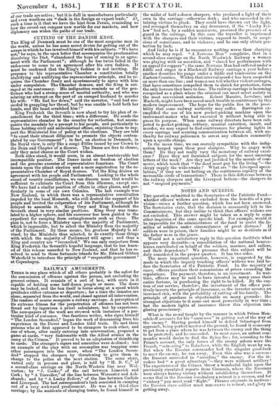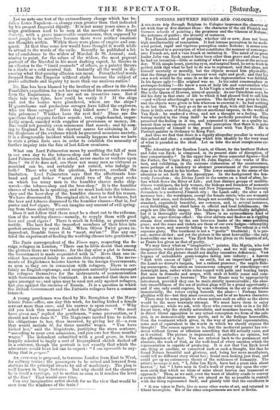NOTES AND QUERIES.
THE question submitted to the Secretaries of the Patriotic Fund— whether officers' widows are excluded from the benefits of a pro- vision—raises a further question, which has not been answered. The Secretaries state, that the decision is necessarily left to the Commissioners, but they incline to think that officers' widows are
not excluded. This answer might be taken as a reply to some other inquiries of the same specific kind. For example, would it be impossible for the administrators of the fund to assist the fa- milies of soldiers under circumstances of great distress ? If soldiers were in prison, their families might be as destitute as if the father were in the grave.
Would not a satisfactory reply to this question facilitate what
appears very desirable—a consolidation of the national benevo- lences contributed on behalf of the soldiers, marines, and sailors, and their dependents ? We presume that this subject will be duly considered in the proper quarter. It has two sides.
The more important question, however, is suggested by the
mode in which the inquiry touching officers' widows was laid be- fore the Secretaries of tie Patriotic Fund. In the majority of cases, officers purchase their commissions at prices exceeding the regulations. The payment, therefore, is en investment. In war- time, officers may be said to have invested in many cases their entire fortune, in purchasing the right to be killed. By the cus- tom of our service, therefore, the investment of the officer posi- tively inverts the principle of insurance, as the invester secures an increased risk, with the probability of cutting off his family. The principle of purchase is objectionable on many grounds : the strongest objections to it come out most powerfully in war-time ; but the modern lights of insurance throw this objection into glaring promineney.
What is the moral taught by the manner in which Prince Men-
schikoff accounts for his " successes" in getting out of the way of the enemy ? Having posted himself to defend Sebastopol from approach, being perfect master of the ground, he found it necessary to get from a place where he was between the enemy and the thing to be protected; and he succeeded. In most cases, an ardent com- mander would desire to find the flying foe; for, according to the Prince's account, the only forces of the enemy ashore were the French, " retreating" to Balaclava, while the English went by sea. But when the Russian commander had the singular good-luck to meet the enemy, he ran away. Even this also was a success : the Russian succeeded in "avoiding" the enemy. For the in- vaders had " a great advantage "—they were without artillery ! The experiences of the Crimea throw a wonderful light upon the previously circulated reports from Cireassia, where the Russians were always having victory without establishing themselves. It seems that in the Russian vocabulary a retreat is a success, and for " victory " you must read " flight." Phrases originate in motives : the Russian slave soldier must marceuvre to retreat, and glory in getting away. et us note one test of the extraordinary change which has be- fallen Louis Napoleon—a ,change ,evr greater than that indicated by his present Imperial dignikly., I It its 5itof many years since a fo- reign gentleman used to be _seen at the meetings of the Royal Society, with a grave immoveable countenance, then supposed by mostpeople to be moveless because there were neither emotions nor thoughts within. Within there were plans of' empire and -con- quoit: At that time some few would have thought it worth while to attend to the words of the exile. Recently he published a let- ter of condolence to the widow of Marshal de St. Arnaud; -and, aiming to paint, for the solace, of the widow, the most piquant portrait of the Marshal in his most dashing .aspect, he throws in an allusion to the " timid counsels" of others, as a painter throws in a shade or a cold neutral tint. Initantly all the world is ai§- etissink what that passing allusion can mean... Parenthetical words dropped from. the Emperor without etndy become the subject of grate solicitude and inquiry by more than one auxioue nation
.
Dr. Rae has been blamed by the -brother of an officer in Sir John Franklin's expedition for not having verified his accounts received from the Esquimaux. They, are not an inventive race. But if their tale were false, how could he verify it ? If the ships and. not the bodies were plundered, -where are the ships'? If quarrelsome and predacious savages have killed the explorers, wile are those savages ? Have they killed more eno they :de? tam prisoners ? Whither have the rest fled?.:. These are:•_the questions that require further search ; ;but, ,single-handed, imper- fectly armed, unaided with .supplies of provisiens or money, Dr.. Raelcould not possibly even commence that search,; and by cora ing to England he took the shortest coarse for obtaining it. If the disclosure of the evidence which he procured occasions anxiety, it is a disagreeable incident which usually happens when we have to state a prima facie case in order to establish the necessity -of further inquiry into the fate of lost fellow creatures.
What can Lord Palmerston mean by ascribing the fall of man in our own day to the tobacco-shop and the beer-shop ? Does Lord Palmerston himself, it is asked, never smoke or venture upon,. Bass ? Or if he does not, are there not many men as virtuous as mankind can be, and certainly not ruined, who indulge in both ? Those who ask the question, however, overlook the limitation. Lord Palmerston says that the afectionate hus- band and good father " must avoid two of the great rocks on which too many men in the humbler classes make ship- wreck—the tobacco-shop and the beer-shop." It is the humbler classes of whom he is speaking, and we must look into the tobacco- shop and the beer-shop of the humbler classes to find his reason. We have discovered it. The original sin is, not beer or tobacco, but the beer and tobacco dispensed to the humbler classes—that is, bad porter and bad cigars. We can imagine any amount of evil spring ing from those docking sources. Does it not follow that there must be a short cut to the reforma- tion of the working classes—namely, to supply them with good beer and good cigars ? There is much in feeding, as graziers can testify. The bees feed the imperfect members of their hive into perfect creatures by royal food. When Oliver Twist grows in- dependent, Bumble traces it to "meat, ma'am !" Ifas any one tried the experiment of feeding the working classes into gentlemen ?
The Paris correspondent of the Tines says, respecting the fa-, reign refugees in London, " There eau -be little doubt that among the plotters there are traitors; for the day after a plot is- formed, the. Government is made acquainted with it." More, than ono in- ciclent has occurred lately to confirm this statement. The'move-. ments of Englishmen become known to the foreign Governments,' as soon as they are in connexion with refugees. There is cer tainly no English espionage, and suspicion naturally looks amongst the refugees thamselves for the instruments of communication with Governments on the Continent. It is asserted that there are spies amongst us ; and spies may be used not only against refugees, ' but also against the enemies of Russia. It is a question in-which the British Government and the. Patriotic refugees-have. a common interest.
A young gentleman was fined by Mr. Broughton at the Mary- lebone Police-office, one day this week, for having kicked a female
servant more than once, and his answer is upon record. Why did you kick this woman ?" asked the Magistrate. " She must have given me," replied the gentleman, "'some provocation, or I should not have done it." The Magistrate invited him to redeem his obligations to her, thus incurred, by giving her 51.—a sum that -would include 3/. for three months' wages. " You have kicked her," said the Magistrate, justifying the stern sentence, "according to your own admission, and you owe her three months' wages." The defendant submitted with a good grace, in terms happily selected to imply a sort of biographical sketch dashed off in a sentence, though the portrait is not exactly that which the adventure would have led one to expect : " I am agreeable to any-. thing that is proper."
An over-way is proposed, to traverse London from East to West, for railway trains ; the passengers to be raised and lowered from stations in the principal streets by aid of machinery. The plan is well known in large factories. But why should not the chamber be in itself a carriage, set in motion as soon as it reaches the level of the line ? That would save time.
Can any imaginative artist sketch for us the view that would be seen from the windows of the train ?

























 Previous page
Previous page